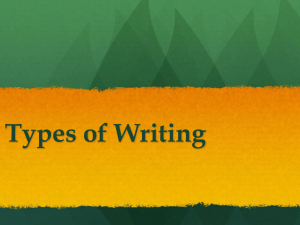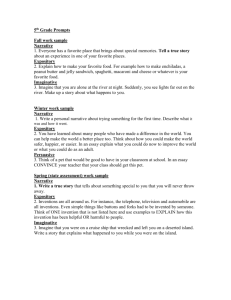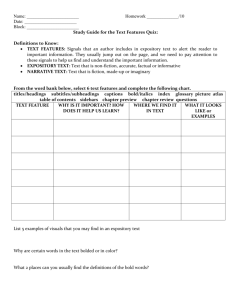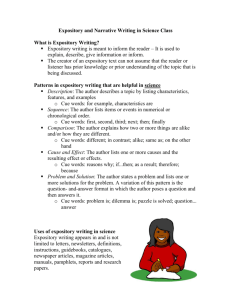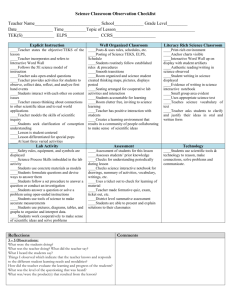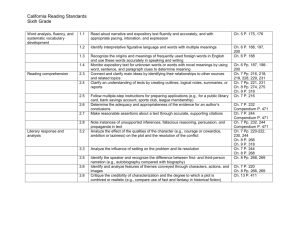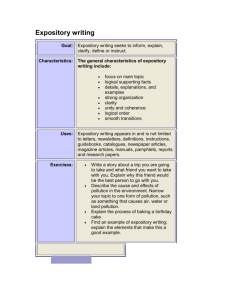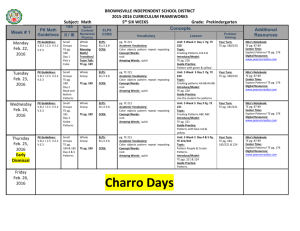6th Grade PreAP 1st 9wks At A Glance
advertisement
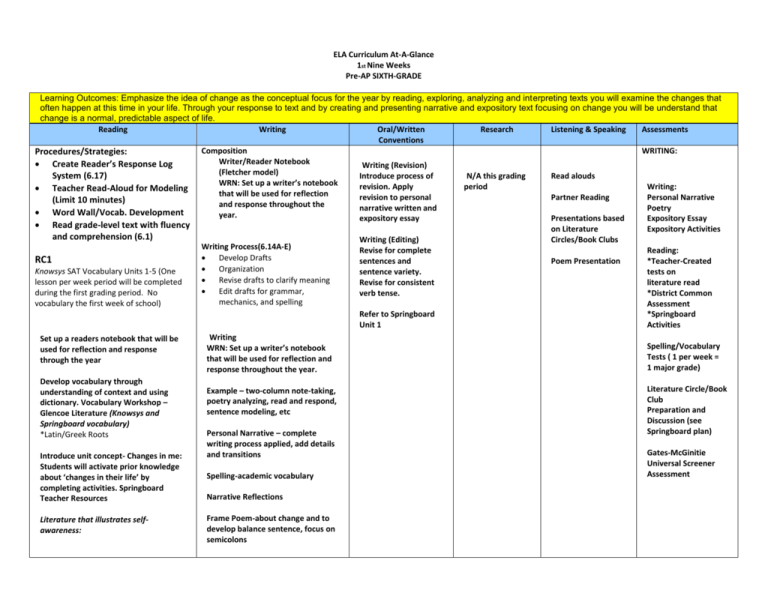
ELA Curriculum At-A-Glance 1st Nine Weeks Pre-AP SIXTH-GRADE Learning Outcomes: Emphasize the idea of change as the conceptual focus for the year by reading, exploring, analyzing and interpreting texts you will examine the changes that often happen at this time in your life. Through your response to text and by creating and presenting narrative and expository text focusing on change you will be understand that change is a normal, predictable aspect of life. Reading Writing Oral/Written Research Listening & Speaking Assessments Conventions Composition WRITING: Procedures/Strategies: Writer/Reader Notebook Create Reader’s Response Log Writing (Revision) (Fletcher model) Introduce process of N/A this grading Read alouds System (6.17) WRN: Set up a writer’s notebook revision. Apply period Writing: Teacher Read-Aloud for Modeling that will be used for reflection revision to personal Partner Reading Personal Narrative (Limit 10 minutes) and response throughout the narrative written and Poetry Word Wall/Vocab. Development year. expository essay Presentations based Expository Essay Read grade-level text with fluency and comprehension (6.1) RC1 Knowsys SAT Vocabulary Units 1-5 (One lesson per week period will be completed during the first grading period. No vocabulary the first week of school) Writing Process(6.14A-E) Develop Drafts Organization Revise drafts to clarify meaning Edit drafts for grammar, mechanics, and spelling Writing (Editing) Revise for complete sentences and sentence variety. Revise for consistent verb tense. Refer to Springboard Unit 1 Set up a readers notebook that will be used for reflection and response through the year Develop vocabulary through understanding of context and using dictionary. Vocabulary Workshop – Glencoe Literature (Knowsys and Springboard vocabulary) *Latin/Greek Roots Introduce unit concept- Changes in me: Students will activate prior knowledge about ‘changes in their life’ by completing activities. Springboard Teacher Resources Literature that illustrates selfawareness: Writing WRN: Set up a writer’s notebook that will be used for reflection and response throughout the year. Example – two-column note-taking, poetry analyzing, read and respond, sentence modeling, etc Personal Narrative – complete writing process applied, add details and transitions Spelling-academic vocabulary Narrative Reflections Frame Poem-about change and to develop balance sentence, focus on semicolons on Literature Circles/Book Clubs Poem Presentation Expository Activities Reading: *Teacher-Created tests on literature read *District Common Assessment *Springboard Activities Spelling/Vocabulary Tests ( 1 per week = 1 major grade) Literature Circle/Book Club Preparation and Discussion (see Springboard plan) Gates-McGinitie Universal Screener Assessment Mentor Text (Springboard): Narrative“Kira-Kira” (novel excerpt) “My super-powers” (short story) Expository“The Oldest Living Atlanta Gorilla Tells All” (article) “How Fire came to the Six Nations” (Folktale) “The Jacket” (novel excerpt) “He might have liked me better…” (expository essay) Poetry Narrative“Who’s Who” Expository“…Little Mermaid” Suggested Novels: Pre-AP - Nothing but the Truth by Avi - The Outsiders by S.E. Hinton - Tangerine by Edward Bloor - The Watsons Go to Birmingham - The Witch of Blackbird Pond Skills Focus – P.O.V., cause/effect, application of story elements, author’s purpose, infer, make connections, text evidence, summarize/paraphrase/synthesize Independent Reading: Reading a wide variety of text suggestions-stories, poems, myths, and informational text. This will help develop more fluent reading skills and vocabulary knowledge. ***Suggestions for independent reading-autobiographical writing, including personal narratives, memoirs, or stories about true happenings. Fiction and non-fiction narrative Expository Essay-explanation of a certain time when change happened in their life Comparison of text ELPS/CCRS ELPS: 4K CCRS: IID1 ELPS: 5G CCRS: IA3 ELPS: 5D CCRS: IA4 ACADEMIC VOCABULARY Springboard Vocabulary: Fluency Characterization Narrative Point of view Expository writing Cause/effect comparison ELA reading and writing connection: Turning point Climax Falling action Rising action Denouement Diction Man vs. man; self; nature ELPS: 3E CCRS: IIIB2
